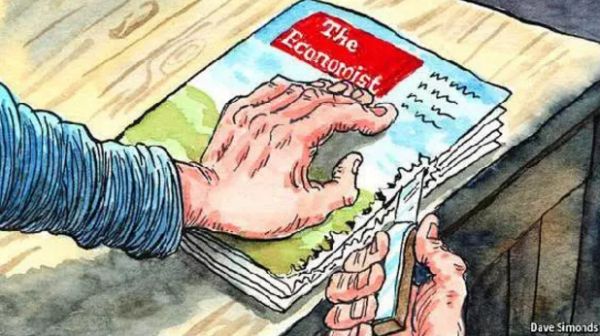The Economist 翻译系列 NO. 2
原文摘自The Economist杂志,APRIL 1ST-7TH 2017
It is time to impose a tax on efficiency
是时候对效率征税了
EFFICIENCY is at the heart of progress. Yet just as too much of a good thing (travel, say) can yield a bad (congestion), so excessive ease in transactions can generate costs, known in the jargon as a “facile externality”, such that less efficiency would actually be more efficient. In academic circles, especially Scandinavian ones, the notion is well established that innovations which eliminate too much hassle could do society harm.
效率是进步的核心。但正如好事(比如说,出行)过头可能会变坏事(拥堵),交易的过度便利有可能会产生额外成本。正如行话所说的“简单外部性”,更低的效率实际上会更有效。在学术圈,尤其是北欧的学术圈,人们很好地认识到,消除太多麻烦的创新有可能会带来社会危害。
True to their cause, the high-minded theorists of facile externality go out of their way to make their ideas hard to understand. The effort required to master them has the happy effect of increasing their value, as intended. But it has also held them back from broad application. The good news is that this may at last be about to change.
简单外部性的志存高远的理论家们忠于他们的目标,已尽力让他们的观点难以理解了。正如他们所期待的,掌握这些观点所需的努力,有提升它们价值的可喜作用。但这也阻碍了它们的广泛应用。好消息是:这种状况可能最终会变。
In the past year facile externality has started to gain traction (a term that, in itself, demonstrates the centrality of friction to progress). This is in part thanks to some well-placed disciples, such as Danilov P. Rossi of the UN’s “Don’t Nudge—Tell” office (DoNuT). But it is also because technology is prompting an exponential loss of friction. Some experts fear a slippery slope.
过去一年间,简单外部性已然发力(事实上,traction发力,这个词本身,证明摩擦主导了进步)。某种程度上,这要感谢一些有地位的信徒,比如联合国“别暗示,直接说”办公室(DONUT)的Danilov P. Rossi。但同时,这也因为技术正在驱动麻烦的指数性降低。一些专家担心会出现灾难性滑坡。
Firms want to erase the sources of inconvenience and delay that irritate consumers. Technology has made this easy for them. Ride-hailing services allow passengers to walk off without fumbling for money. Streaming video brings the next episode to viewers just before the previous one ends. As Jerry Seinfeld once observed: “I love Amazon 1-click ordering. Because if it takes two clicks, I don’t even want it any more.”
公司们想要消除所有造成客户不满的不便和延迟因素。技术已经使他们能够轻易做到这点。即时用车服务使得乘客们不用掏钱就可以直接下车。流媒体视频能在上一集刚结束就开始播放下一集。正像Jerry Seinfeld所说:“我喜欢亚马逊的一键下单。因为如果要点击两下,我根本就不想买了。”
In all this indulgence, the forgone benefits of hassle (slygge in Danish) go largely unrecognised. Frictionlessness encourages bad habits. For those who resent the time suck of 1-click ordering, Domino’s has pioneered “zero-click” pizza-buying. Simply open the app and, after ten seconds, it automatically places a pre-set order. Domino’s competitors are working on a “direct-to-mouth” drone-delivery service that will send individual slices of pizza into your home via an electronic flap. Pizza experts are seeking ways around the “chewing bottleneck”.
在所有这些享受中,放弃的麻烦的好处大部分未被意识到。顺畅助长了坏习惯。对于那些连一键下单的时间都不耐烦的人,Domino's率先推出了“零点击”披萨购买服务。只要打开APP并等待10秒钟,会自动下一个预设的订单。Domino's的竞争对手们正致力于“直接到嘴”的无人机送货服务,可以通过一个电子振动将各人的披萨块送进家中。披萨专家们正在寻找方法解决“咀嚼瓶颈”。
Payments are also subject to facile externality. Three in five Britons say they spend more with a wave of the plastic than they would with cash. Ordering goods using Alexa, a voice-activated assistant, is as easy as saying its name. Tech firms are working on gesture-controlled devices that could enable payments with just a furtive glance of desire.
付款也受简单外部性的影响。3/5的英国人说他们在刷卡时比用现金时花得更多。用Alexa,一个语音助手,订货时,就好像叫了下名字那么简单。技术公司们正致力于开发手势控制的设备,只要一个悄悄的、想要的眼神,就能触发支付。
But the great curse of facile externality is value-erosion. Persistent need is the world’s great motivator. With instant gratification, consumers end up alienated and economies worse off.
但是简单外部性的大灾害是价值腐蚀。持续的需求是世界发展的重大发展动力。随着即时满足的实现,顾客们最终变得疏离,而经济也开始恶化。
Take back control
拿回控制权
A few companies have recognised the benefits of restoring friction. Research into “the Ikea effect”, named in honour of those happy hours spent with an Allen key, a Billy bookcase and a rising hatred of Sweden, shows that people put extra value on things when they devote their own labour to them.
一些公司已经意识到找回麻烦的好处。对于“宜家效应”(用以纪念与Allen钥匙、Billy书柜所共度的美好时光,以及对瑞典人的日益厌恶之情)的调查表明,人们会对那些投入自己劳动的东西赋予额外的价值。
But the market cannot solve this problem on its own. As Mr Rossi says, only government can properly defend the cause of inefficiency. DoNuT is calling for ideas. Since time-wasting is of the essence, it has imposed a deadline of April 1st next year.
但是市场无法自己解决这个问题。正像Rossi先生说的,只有政府才能恰如其分地捍卫低效率事业。DONUT也在呼吁这些理念。既然浪费时间极其重要,就把截止日期放在明年4月1日。
We at The Economist plan to lead by example. From next week, readers will need an extra tool: a paper knife with which to separate the pages of their copy. Henceforth, you will have to slit apart the folded pages of our folios to enjoy the words within. And you will, we are sure, thank us for it.
我们经济学人杂志则计划以身作则。从下周起,读者会收到一个额外的工具:一把裁纸刀,用于把杂志的页面裁开。从此以后,你都需要把折叠装订的页面裁开,才能品味里面的内容。我们确信,你会感激我们这么做的。
本译文仅供个人研习、欣赏语言之用,谢绝任何转载及用于任何商业用途。本译文所涉法律后果均由本人承担。本人同意平台在接获有关著作权人的通知后,删除文章。
